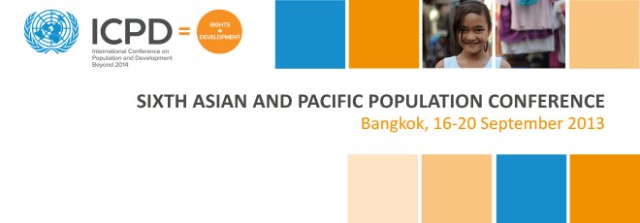September 14, 2013 - From Monday, September 16 to Friday September 20, some 300 representatives of 40 countries will come together for the 6th Asian and Pacific Population Conference in Bangkok, Thailand during which participants will review the region's successes, challenges and future priorities in the area of population and development.
The agenda will cover a wide range of issues including poverty reduction, sexual and reproductive health and rights, HIV and AIDS, gender equality, youth, ageing, migration, and sustainable development. Pacific island country representatives are from Tonga, Samoa, Tuvalu, Cook Islands, Niue, Solomon Islands, Vanuatu, Fiji, Nauru, Marshall Islands, Federated States of Micronesia and Kiribati.
The President of Kiribati His Excellency Anote Tong has graciously accepted the invitation to deliver the key note address; the delegation representing Pacific island nations number 40 and includes ministers of health, members of parliaments, senior government officials and treasured partners of civil society.
The APPC is a once-in-decade gathering which shapes the regional population agenda; this year however it coincides with the review process of the International Conference of Population and Development (ICPD) Programme of Action. A Ministerial Declaration at the end of the week will serve as the Asia-Pacific input to the United Nations General Assembly special session on the International Conference on Population and Development (ICPD) beyond 2014. In the context of a wider UN effort to determine a new global development agenda, the ICPD Beyond 2014 review aims to put the sexual and reproductive health and rights of women, girls and marginalized groups at the heart of future development goals.
The conference is convened by the United Nations Economic and Social Commission for Asia and the Pacific(ESCAP) in collaboration with UNFPA, the United Nations Population Fund.
The gathering has implications on the Pacific development agenda, whether one speaks of regional or country-specific plans. It is therefore a process which people, particularly Pacific youth who make up one-fifth of the region's population and whose future will be discussed next week, should be informed about. Civil society and young people's representatives have been meeting last week to formulate a submission to the main conference, this week. In this context, the UNFPA Pacific Sub-Regional Office will issue press releases, interviews, images and videos, and other media-related resources during the meeting which we invite you all to utilize as you feel appropriate.
Media enquiries can be sent to Ariela Zibiah at zibiah@unfpa.org Media personnel are also invited to visit theUNFPA Pacific website for updates or LIKE our Facebook page or follow us on Twitter.
Shaping a Future Based on Rights, Dignity and Health for All
Safe motherhood I Family planning I Gender-based violence I Population and Development I Adolescent and Youth I Emergencies I Child Marriage I HIV/AIDS I


